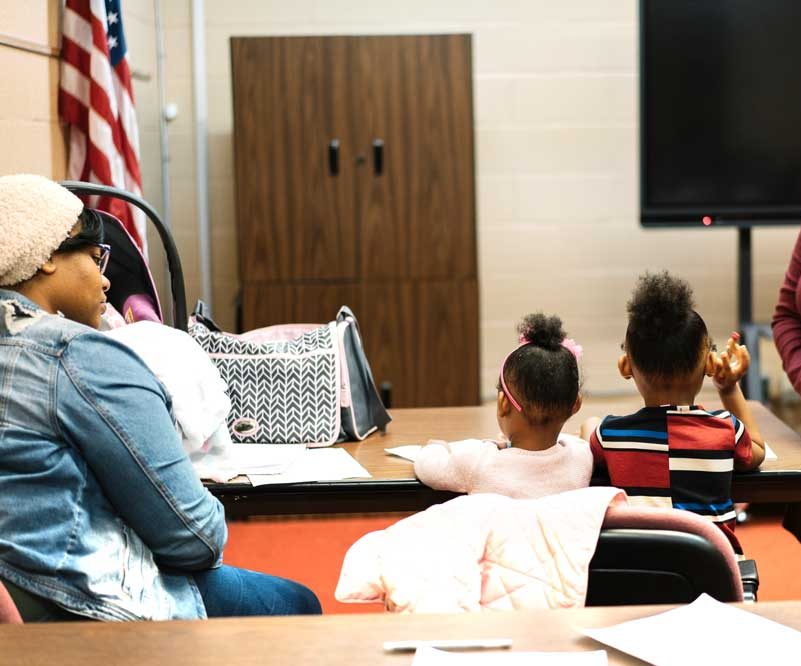5 Ways the Two-Generation Approach Helps Mississippi Women and Their Families Thrive
June 7, 2022 - General News - Posted by Women's Foundation Team

Did you know that when you support the Women’s Foundation, you’re actually helping to support the next generation of Mississippi women? That’s because we utilize what is known as the “two-generation approach” in our grantmaking process. In this article, we’ll explore the two-generation approach and five reasons why it is essential in helping women and their families thrive.
What is the Two-Generation Approach?
As the name suggests, using the two-generation approach to create or allocate supportive resources such as grants, scholarships, or community initiatives involves considering the needs of two generations of a family unit—parents and their children. This approach is more holistic and dynamic in providing support for families than methods that focus on supporting parents and children separately because it addresses key systems that may be negatively impacting their economic security or education.
It Can Help Break the Cycle of Poverty
According to recent statistics from the U.S. Census Bureau, nearly 22% of working-aged women live in poverty in Mississippi. Living in poverty has been linked to an increased risk of developing chronic disease, mental illness, and lower life expectancy. Women have a higher risk of living in poverty than men, due to existing systems of discrimination and economic inequality, and are more likely to enter what is called the “cycle of poverty”.
The “cycle of poverty” is an economic term used to describe the tendency for poverty to persist in families due to both a lack of resources and the existence of active systemic barriers (such as unaffordable education or health care). Oftentimes, outside support is needed to help families break the cycle. The two-generation approach is an effective way to do just that because it addresses both elements that perpetuate the cycle.
Take, for example, the Women’s Foundation of Mississippi’s work with 2nd Chance Mississippi. This collaborative initiative provided financial support to over 1,000 low-income female students to complete their education and successfully transition into the workforce. This initiative helped address the lack of supportive resources by offering scholarship funds to participants, and in doing so helped those students overcome the systemic barrier of unaffordable education. These women will go on to have more lifetime earning potential and will ultimately go on to provide more opportunities for themselves and their families to thrive.
It Addresses Multiple Systems & Increases Opportunities for Families
In addition to helping break the cycle of poverty, the two-generation approach is also effective in addressing multiple systems that can negatively impact women. That’s because this approach considers all aspects of a family’s life and seeks to address a wide range of needs.
By addressing the needs of both parents and children, the two-generation approach is able to ensure the success of families in more ways than one. Parents who are interested in completing their degrees, furthering their careers, or switching disciplines can do so because they have access to affordable and quality childcare for their children.
They may also have access to scholarships or other financial resources that help them with pursuing their higher education. Children, on the other hand, may be able to enroll in early education programs or after-school programs that can help increase their ability to learn and be creative, successful adults. They may also be placed in quality childcare centers that help inspire their interest in learning, while also allowing parents the opportunity to advance their careers.
It Strengthens Local Economies
And the importance of childcare can’t be overstated as it is essential for parents to pursue career advancement. Mississippi’s economy loses an estimated $637 million a year due to a lack of affordable or accessible childcare.
Women are directly affected by this, as the lack of accessible childcare may increase their chance of delaying or opting out of entering the workforce in order to care for their children. This has been shown to decrease their earning potential, which may affect their ability to earn higher degrees or complete training, and ultimately slows local economic growth.
However, utilizing the two-generation approach to address this gap can help give women the support they need to fulfill their career goals, and in turn support and strengthen their local communities.
It Creates Brighter Futures
Ultimately, the benefits of the two-generation approach, whether for grantmaking, law-making, or developing community or job-related supportive programs, help create brighter futures for generations to come.
Learn More
Click here to learn more about how we use the two-generation approach to help women thrive and what you can do to show your support.
